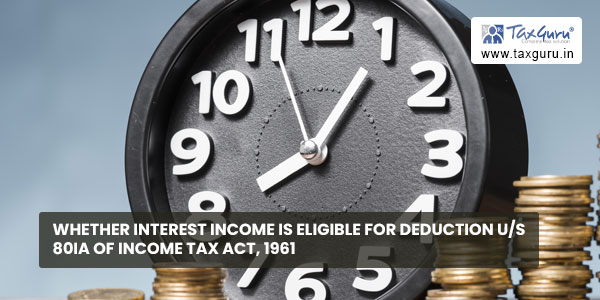In Income Tax Act, deduction has been prescribed specifically for industrial undertakings or enterprises engaged in infrastructure development, etc. vide section 80-IA. Hundred percent of the profits and gains derived from eligible business shall be allowed as deduction for ten consecutive assessment years. Eligible business comprises business of developing, operating or maintaining Infrastructure facilities, Telecommunication services, Industrial parks or SEZ, Power Generation, transmission or distribution, Reconstruction of a power unit and Natural gas distribution. The idea behind providing such incentive is to promote efficiency in the industry. However, deduction under this section is not available to the undertakings which starts their business after 01.04.2017.
As per the provisions, hundred percent of the profits and gains derived from eligible business shall be allowed as deduction, if it means that whole of the income of such assessee is deductible, if it implies complete tax holiday for such assessees?
Well, in the recent High Court Judgement, the High Court of Orissa has answered this question. The question placed before the high court was that if the interest income shall be eligible for deduction u/s 80-IA.

Let’s consider the case law – Odisha Power Generation Corporation Ltd. v/s Assistant Commissioner of Income-tax.
The assessee, Odisha Power Generation Corporation Ltd. was engaged solely in the business of power generation (an eligible business). All the power generated, was sold exclusively to Grid Corporation of Odisha Limited (GRIDCO) under a Power Purchase Agreement (PPA). Assessment years in question were 2002-03, 2003-04, 2007-08 and 2008-09. In each of the assessment year, initially, the assessee had filed a return disclosing total income as Nil and afterwards, filed revised return, this time disclosing the income after claiming deduction under section 80-IA.
The income of the assesse comprised the interest income that was earned by the assessee from advances given to its employees as well as provision of electricity and water charges collected from water through its employees and contractors for facilities in the township, receipt from transit hostel, sale of scrap, insurance claim etc. Also, it included interest earned on bonds issued by GRIDCO to the Assessee in lieu of unpaid energy bills i.e. for delayed payment of the power bills.
The ITAT rejected the assessee’s claim u/s 80-IA on the ground that the assessee failed to show “any nexus between the impugned interest received by it with interest payable”. Further, the ITAT held that the interest was earned by the Assessee from investment of funds in GRIDCO bonds and cannot be considered as income received for late payment of electricity. Accordingly, deduction was disallowed to assessee.
Concerning said disallowance, assessee’s counsel stance was that if the profits of business include certain receipts which have corresponding costs, or if the profits include certain credits and the business also has debits of the same nature, unless the same are netted out against each other, the profit of the business will present a distorted picture and may lead to injustice while implementing an incentive provision. Hence, while computing profit of the business of industrial undertaking u/s 80-IA, revenue receipts should be adjusted against revenue expenditure of the like nature. It was submitted that revenue receipt in the form of interest on loans and advances given to the employees, receipts of rent and electricity charges and other sundry receipts etc. would reduce the revenue expenditure of other related expenditures. Thus, such receipts and related expenses are totally linked and is having direct and proximate nexus with assessee’s business of power generation and distribution.
As counter submission, the counsel for department presented that if we perceive section 80-IA, the critical words were that the other income must be derived from the business of generation of electricity and not merely ‘attributable’ to it i.e. such income should have a direct and active nexus to the main activity. It contended that the income, profit or gain cannot be said to have been ‘derived’ from an activity, merely because such activities may have helped the Assessee earn income or profit in an indirect manner. This way, ITAT justified the disallowance.
However, the assessee disagreed with the said disallowance and being aggrieved, filed an appeal in High Court. The assesse put his set forth, regarding the interest income earned on providing advances to its employees as well as other facilities and interest on the bonds issued by GRIDCO, as that the facilities that were given to its employees were for better conditions of employment. This was to improve the overall efficiency of the undertaking, which is devoted to its sole purpose of power generation and therefore, close nexus is established. At this, the court found no difficulty in accepting the submission of the Assessee that the interest received on advances and loans given to its employees are receipts in normal course of carrying its business and should be considered as income derived from its essential business activities.
Likewise, the late payment by GRIDCO for the electricity supplied, is sought to be made up by issuing bonds, on which the Assessee earned interest. This also therefore, has a direct nexus with the essential business activity of the Assessee.
Further, the court was satisfied with the netting principle, since the Assessee undertook no other activity except power generation and hence, decided the case in assessee’s favour and held that the AO, CIT(A) and the ITAT were in error in disallowing the deduction u/s 80-IA.
At this, one may conclude from the High Judgment that relief u/s 80-IA shall be granted if the income has close and direct nexus with the principle business activities of the assessee and therefore, interest income shall also be allowed to be eligible for 80IA deduction.
About the Author

Author is Shruti Garg Senior Associate in Neeraj Bhagat & Co. Chartered Accountants, a Chartered Accountancy firm helping foreign companies in setting up business in India and complying with various tax laws applicable to foreign companies while establishing their business in India. Neeraj Bhagat & Co. Chartered Accountants, is a well-established Chartered Accountancy firm founded in the year 1997 with its head office at New Delhi.






well explained
Informative